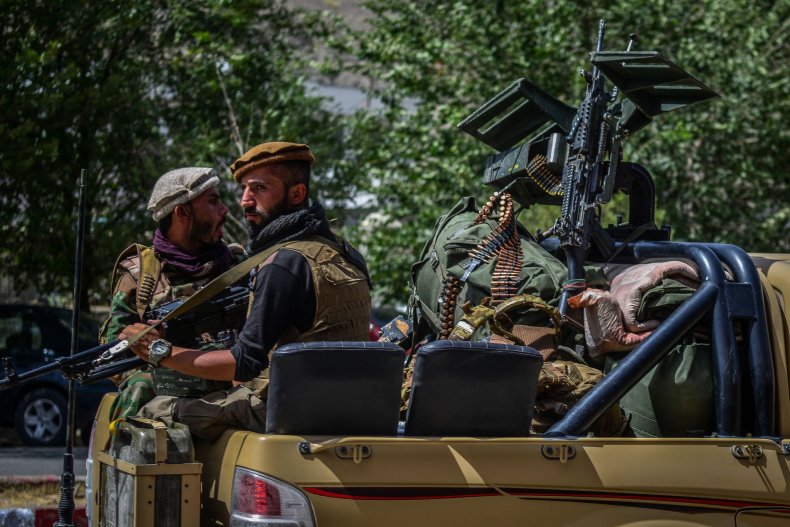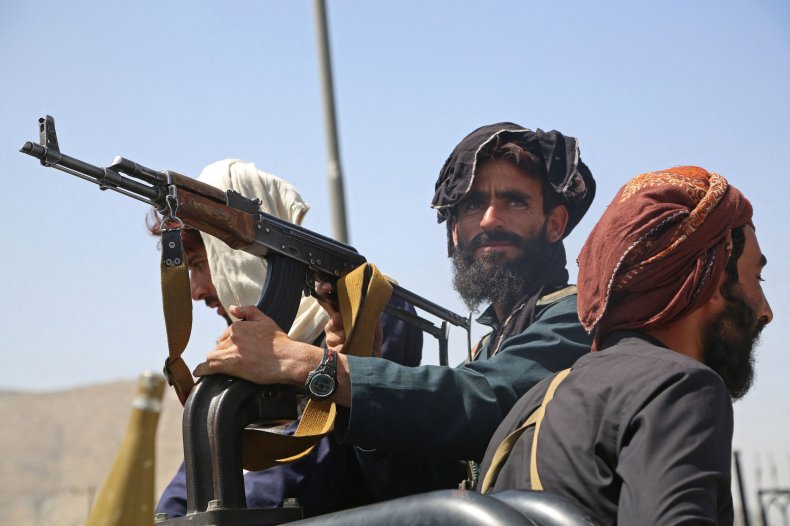TOM O'CONNOR
The sudden, dramatic collapse of the Islamic Republic of Afghanistan in the wake of a U.S. military withdrawal immediately followed by rapid Taliban advances has captivated international audiences, eliciting fear and awe across the globe.
But a new report released Tuesday by the U.S. government's congressionally mandated watchdog on Afghanistan and obtained by Newsweek details two decades of failures that led up to the historic events still unfolding in the capital city of Kabul and across the country.
A devastating array of shortcomings are outlined in the latest report by the Special Inspector General for Afghanistan Reconstruction (SIGAR), including attempts to establish mismatched Western institutions to shifting missions throughout successive administrations, and fueling Afghanistan's endemic corruption with corner-cutting projects that ultimately never came to fruition.
"After conducting more than 760 interviews and reviewing thousands of government documents, our lessons learned analysis has revealed a troubled reconstruction effort that has yielded some success but has also been marked by too many failures," the report said.
The report identified key areas in which the U.S. approach failed, including incoherent strategies, unrealistic timelines, unsustainable institutions, counterproductive personnel strategies, rampant insecurity and a fundamental lack of understanding of Afghanistan's social, economic and political context.
But even people who are painfully aware of the deep-rooted issues that had metastasized within the Afghan government and its security forces throughout the years expressed bewilderment at the speed at which Kabul's house of cards collapsed.
Jonathan Schroden of CNA, a nonprofit research and analysis organization, serves as director of its Countering Threats and Challenges Program, and has traveled to Afghanistan numerous times over the past two decades, including at the request of U.S. military leadership.
He highlighted three out of what he said were a "myriad" of reasons why the Afghan state never stood a chance from the outset of the U.S.-led intervention launched by former President George Bush 20 years ago, just weeks after 9/11.
"The U.S. approach to Afghanistan was incoherent from the day it captured Kabul from the Taliban," Schroden told Newsweek. "Bush felt he owed it to Afghanistan to leave it better than he found it, while [Defense Secretary Donald] Rumsfeld just wanted to get the hell out. That incoherence of purpose wasted a window of opportunity to get a viable security structure in place before the Taliban resurgence."
The first mistake begot the following two.
"Because we wasted that window, we were stuck playing catch-up—fighting a strong insurgency while also building the Afghan National Defense and Security Forces," he said. "That led to consistent prioritization of operational expedience over sustainability."
Schroden said the U.S. was stuck in old paradigm, which it tried to apply to Afghanistan.
"The U.S. never adequately adjusted its preferred mode of building foreign security forces—buying and giving them stuff—to the human capital that was available in Afghanistan," he said. "We simply gave them too much stuff that they couldn't operate, maintain, or sustain."
"All of that left a military that was a paper tiger," Schroden added. "It seemed okay so long as you didn't look too closely at it and the U.S. was there to back it up."
 "The U.S. never adequately adjusted its preferred mode of building foreign security forces—buying and giving them stuff—to the human capital that was available in Afghanistan," Jonathan Schroden, director of the CNA think tank's Countering Threats and Challenges Program, told Newsweek. In this photo, soldiers from the Afghan Security Forces travel on an armed vehicle along a road in Panjshir province in Afghanistan on August 15. The fate of Afghan troops and police remain uncertain as the Taliban asserts control over the country.AHMAD SAHEL ARMAN/AFP/GETTY IMAGES
"The U.S. never adequately adjusted its preferred mode of building foreign security forces—buying and giving them stuff—to the human capital that was available in Afghanistan," Jonathan Schroden, director of the CNA think tank's Countering Threats and Challenges Program, told Newsweek. In this photo, soldiers from the Afghan Security Forces travel on an armed vehicle along a road in Panjshir province in Afghanistan on August 15. The fate of Afghan troops and police remain uncertain as the Taliban asserts control over the country.AHMAD SAHEL ARMAN/AFP/GETTY IMAGESSIGAR, led by Special Inspector General John F. Sopko, was one of the few organizations to look too closely.
For 13 years, reports have painted an increasingly bleak picture of what was transpiring in Afghanistan. Compiling interviews with officials and media reports, SIGAR's stories of U.S. personnel watching television shows such as "Cops" for inspiration on training Afghan law enforcement and copy-and-pasting proposals on Iraq to in an attempt to nation-build in Afghanistan inspired little confidence about the state of the U.S. mission.
"We were devoid of a fundamental understanding of Afghanistan," Douglas Lute, a retired U.S. Army lieutenant general who served as deputy national security adviser for Iraq and Afghanistan from 2007 to 2013, told SIGAR in a 2019 quote once again featured in the latest report. "We didn't know what we were doing."
The lack of consistency and coherence permeated from administration to administration, with constant redirection, cancellation and mission creep over the course of two decades blurring any singular vision for Afghanistan's future from taking hold.
"The U.S. reconstruction effort in Afghanistan could be described as 20 one-year reconstruction efforts, rather than one 20-year effort," the SIGAR report found.
For policymakers, the pitfalls of a war that passed through the hands of four different U.S. presidents always appeared to be the fault of a predecessor or a successor, but never the incumbent.
While it was former President Donald Trump who struck the deal with the Taliban that ultimately led to the U.S. exit, it was President Joe Biden who took credit for breaking the cycle.
"I know my decision will be criticized, but I would rather take all that criticism than pass this decision on to another President of the United States, yet another one, a fifth one," Biden said in remarks Monday amid the chaos in Kabul.
"Because it's the right one," he added. "It's the right decision for our people. The right one for our brave service members who have risked their lives serving our nation. And it's the right one for America."
The palpably frustrated president also addressed the lack of resistance among Afghan security forces as the Taliban entered Kabul.
"There's some very brave and capable Afghan special forces units and soldiers, but if Afghanistan is unable to mount any real resistance to the Taliban now, there is no chance that one year, one more year, five more years, or 20 more years of U.S. military boots on the ground would've made any difference," he said.
At the Pentagon, Press Secretary John Kirby redirected a press question as to why the Afghan security forces, by and large, did not fight back.
"I think it's a question better posed to the political and military leadership of our Afghan partners," Kirby said.
Like Biden, he appeared to acknowledge that the war effort was hopeless.
"You can resource, you can train, you can support, you can advise, and you can assist, but you cannot buy will," Kirby said. "You cannot purchase leadership, and leadership was missing. And we've been saying for weeks that when we look back at the outcome, whatever the outcome is and now we know, that we are going to be able to say that leadership was the deciding factor, and I think that that has proven to be true."
Afghan President Ashraf Ghani fled the country in the leadup to the Taliban advance on Kabul, a decision he explained by saying he hoped it would avoid more bloodshed.
But in Afghanistan, the sudden exit was viewed as yet another indication that Ghani's grip on power was tenuous, held together only by the presence of U.S. forces.
"Many people—especially those in the West—believed that Afghans must have been supportive of Ghani's government because the Taliban alternative was so awful in their eyes. But to many Afghans, it was a 'Sophie's choice,'" Schroden said, referencing the 1979 novel and 1982 film about a mother forced by Nazis to choose which of her two children should live during the Holocaust.
Schroden argued there were no easy answers in Afghanistan either.
"On one hand was the Taliban's heavy-handed, limited-freedom authoritarian security and religious justice. On the other hand was a predatory and selfish government that couldn't bring security and offered little in the way of inclusive services to those it governed," he said. "In hindsight, it's little wonder that many Afghans decided what they really wanted was simply to live, and not die fighting to make that choice."
But Ghani's unannounced exit has left an ominous void in place of the country's highest office, adding insult to injury for those who still felt he was the better choice.
"Common people and Ghani's cabinet members that I spoke with are all mad at Ghani's illogical decision to flee himself and his limited henchmen without appointing someone to take care of the Government affairs temporarily," Ahmad Shah Katawazai, a diplomat who served as a liaison to the Afghan Defense Department at the country's embassy in Washington, told Newsweek. "Leaving the country with a power vacuum was a bad decision and an insult to all Afghans."
While in power, Ghani's leadership sought to present itself as a more democratic, egalitarian choice for Afghanistan endorsed by the U.S. and international community at large, but it left the Afghan government in a particularly vulnerable position.
"Ghani's government, especially the security leadership, failed to manage the security forces," Katawazai said. "Lack of coordination and low morale of the ANDSF coupled with lack of attention to the needs of the ANDSF led to their desertion and surrender."
And while this may have accelerated the fall of the Kabul government, what ultimately turned the tables was the Taliban's ability to mount a formidable, comprehensive campaign both militarily to gain ground and diplomatically to help Kindle the U.S. realization that the war was no longer worth fighting.
"The Taliban had launched a robust and strategic psychological warfare that contributed a lot to their success," Katawazai argued, "while Ghani's establishment drowned in corruption and internal rifts had no proper strategy to counter that."
"Key success for the Taliban has been not harming those who surrendered," he added. "Internationally from the last few months, the ANDSF was deprived of the close air support, key leverage for the ANDSF in the battlefield. That inflicted huge damage to the security forces."
Now the only forward may be to find common ground with the victorious Taliban.
Al Jazeera reported Monday that Abdullah Abdullah, the head of the High Council for National Reconciliation, former President Hamad Karzai and Islamic Party chief Gulbuddin Hekmatyar are heading to the Qatari capital of Doha to negotiate the country's political future with the Taliban.
"Power-sharing government is the only way out of this mess," Katawazai said.
"Without a power-sharing government, the Taliban won't get international legitimacy and will turn into an isolated and pariah state that I believe the Taliban also don't want. Currently in Doha negotiations are going on to chart out the structure of the future government. Hopefully, there will be an agreement on that soon."
 Taliban fighters stand guard in a vehicle along the roadside in Kabul on August 16, after a stunningly swift end to Afghanistan's 20-year war, as thousands of people mobbed the city's airport trying to flee the group's feared hardline brand of Islamist rule.AFP
Taliban fighters stand guard in a vehicle along the roadside in Kabul on August 16, after a stunningly swift end to Afghanistan's 20-year war, as thousands of people mobbed the city's airport trying to flee the group's feared hardline brand of Islamist rule.AFP
No comments:
Post a Comment